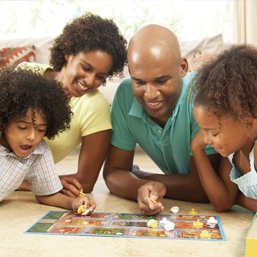
You might enjoy a family game night from time to time! However, you may also notice that games designed to have a winner bring out a certain level of competition and instigate fighting between the members of your family.
If your game night is often cut short with tears, accusations of cheating and children stomping off to their rooms, you are not alone. Keep the arguing to a minimum and enjoy your game night with these cooperative games! These games promote teamwork rather than focusing on competition, so you are playing together, not against each other.
Collaboration and working together to come up with a strategy to win improves communication and listening skills, and can give your kids a new respect for each other as they try out the other sibling’s idea and realize it works! Many of these games teach other skills as well including matching, colors, counting and reading.
Ages 4 and up
Hoot Owl Hoot. Move all the owls back to their nest before the sun comes up. Teaches strategy, following directions, taking turns, sharing, problem solving, self-esteem, color matching.
Outfoxed. Move around the board to collect clues and catch the fox who stole Mrs. Plumpert’s pot pie. Teaches cooperation and deductive reasoning.
The Family Treasure Hunt Game. Follow riddles and picture clues in a scavenger hunt to find the treasure. Teaches reading, logic, writing, vocabulary, teamwork, motor skills.
Ages 5 and up
Race to the Treasure. Work together to beat the ogre to the treasure by making the best path possible. Teaches strategy, social development, math grid concepts, shared decision making.
Cauldron Quest. Get three correct ingredients into the cauldron before the evil wizard blocks your path to victory. Teachers strategy, problem solving, self-esteem, social skills.
Space Escape. Work together to gather your equipment and get to the escape pods before it’s too late! Teaches matching, cooperation, strategy, communication, problem solving.
Ages 8 and up
Ghost Fightin’ Treasure Hunters. Collect treasures from a haunted house and then make your escape. Teaches strategy, cooperation, problem solving.
The Game. Work together to discard all 98 number cards, but you’re not allowed to tell anyone else
what cards you have! Teaches teamwork, strategy, counting, cooperation.
Mmm! Work together as mice to eat all the food in the pantry before the family cat comes! Teaches matching, calculated risk, teamwork (can be adapted for players
as young as five).
Ages 10 and up
Castle Panic. Work together to defend your castle against invaders. Teaches teamwork, cooperation, strategy (the junior version called My First Castle Panic teaches younger children about shapes, colors, matching, taking turns and planning ahead).
Mysterium. A team of mediums try to investigate a murder using mysterious hints from a ghost. Teaches cooperation, abstract thinking, communication, mystery solving, strategic thinking.
Spirit Island. Island spirits work as a team to defend their homeland from invasion. Teaches cooperation, strategy, problem solving.
Another great idea for a cooperative game night is to check out some escape room-style games. These can run a huge age range, but children generally need to be at least five to understand the concept. The basic idea behind all escape room games is the same: Work together to get out in a set
time period. You can purchase a pre-packaged one, or find them for free (or a small fee) online and print them out yourself.
Game night is a perfect way to connect as a family – why not work together as a unit rather than spending your time fighting over who won? CCM
See our related articles:
Calgary’s Child Magazine © 2024 Calgary’s Child